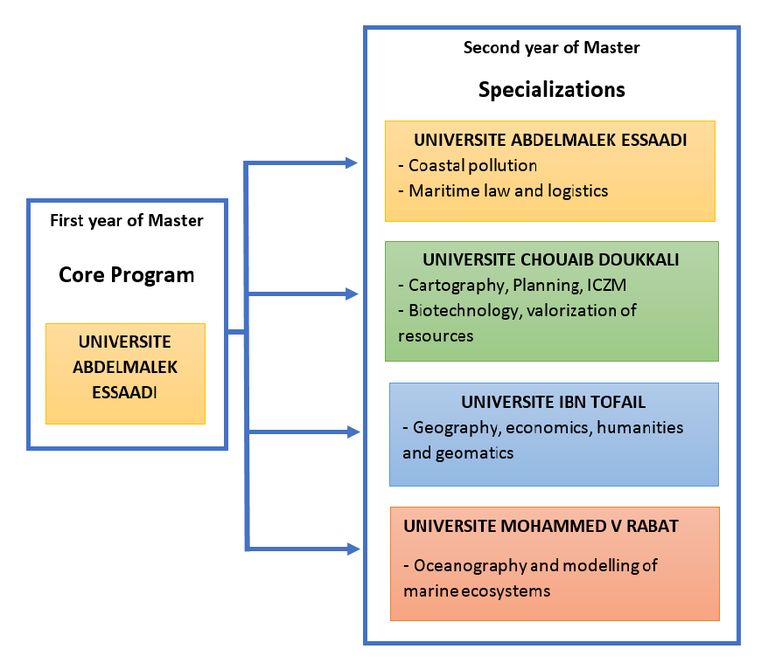The Master
The ScolaMAR Master program
The ScolaMAR Master program
The ScolaMAR project aims to provide skilled graduates suited to the needs of the Moroccan labour market, for the implementation of Smart coastal management and Sustainable blue growth, therefore increasing employability of Moroccan graduates and responding to the challenges posed by the implementation of the 2015 Coastal Act.
To reach its objectives, the ScolaMAR strategy is to develop an innovative and specialized Master program based on the integration of the multidisciplinary dimension of Marine and Coastal Science and innovative pedagogical mathds (SPOC, Active Learning).
This regional specialized Master degree to be developed will have six specializations spread amongst the Moroccan universities. The future graduates from this innovative Master program covering all the fundamental aspects of ICZM will be able to actively participate in the sustainable development of their society and global sustainable blue growth over the long-term.
The Master program will be located at the Université Abdelmalek Essadi.
During the first year, student will receive common training of transversal subjects at the Université Abdelmalek Essadi.
Students will follow an online training module using the developped SPOC (Small Private Online Course) on coastal risks.
For the second year, they will have to choose a specialization within the four Moroccan partner universities:
The Université Abdelmalek Essadi will offer two specializations:
- Coastal pollution
- Marine law and logistics
The Université Chouaib Doukkali will offer two specializations:
- Cartography, planning and ICZM
- Biotechnology and valorization of resources
The Université Ibn Tofail will offer one specialization:
- Geography, economics, humanities and geomatics
The Université mohammed V de Rabat will offer one specialization:
- Oceanography and modelling of marine ecosystems
The elaboration of the 18 training modules of the Master's program will be based on the feedback and activity reports of the staff and students who will have participated in the "Job-shadowing" activities at the Data Management Applied School and the integrative conferences.
At the end of the ScolaMAR project, Moroccan partners will have developed an innovative Master program which will be submitted for co-accreditation to the Ministry of Higher Education, Scientific Research and Management Training in Morocco (MESFCRS)
The program provides for 90 students per cohort, including 15 students per specialization.

The SPOC (Small Private Online Course)
The SPOC on Coastal risks
The SPOC "Coastal Risks" is part of the WP 4- Development-Integrative Approaches. It will be integrated into the innovative Master program as a module for digital and transversal teaching.
The SPOC "Coastal Risks" will be developed from the MOOC (Massive Online Course) FlotRisCo offered at the Université de Bretagne Occidentale to be adapted to the Moroccan context.
Development process:
- Adapted the content of the MOOC to the Moroccan context
- Transforming MOOC into SPOC
- Transfer the procedures of animation and creation of a module for digital education to the Moroccan partners.
The Portfolio of competences
The Portfolio of competences
Working closely with socio-economic actors is the strategy chosen by the ScolaMAR consortium to guarantee the increase in the employability of young graduates in the field of integrated coastal zone management.
The project aims to provide executives and managers able to coordinate and promote training and research in the field of science, economics and law of the sea, as well as decision-makers with skills capable of designing methodologies and propose solutions that can help mitigate and adapt to climate change in the Mediterranean and Africa.
The Moroccan partner-universities will establish a portfolio of competences based on an analysis of the specific needs expected by employers in the ICZM sector. Beyond the theoretical knowledge, the professional profile of the graduates is also composed of know-how and know-to-be.
The Portfolio of competences will list the knowledge and skills with the collaboration of the departments of human resources of the socio-economic actors in the fisheries, tourism, land-use planning, climate change, transport and maritime logistics sectors.
The socio-economic actors involved in the ScolaMAR project so far are :
- Region Tangier-Tétouan -Al Hoceima
- Port TangerMed (TMSA)
- National Agency of Ports
- Maritime Ports and Public Domains Directorate
- National Agency for Aquaculture Development (ANDA)
- National Institute for Fisheries Research (INRH)
- Nador MedWest and Agence Marchika
- Drapor and Atlantic Dredging Morocco
The "Active Learning Tool-Kits"
The tools for an innovative pedagogy
Within WP3-Innovative pedagogical approaches- a deep reflection will be conducted on how to integrate active learning and other innovative pedagogical approaches suited to the Moroccan higher education context in the training of students.
"Active Learning engages students in the process of learning through activities, group work and/or discussion, as opposed to passively listening to an expert. It emphasizes higher-order thinking, facilitates independent, critical, and creative thinking, encourages effective collaboration and increases student investment, motivation and performance. In practice, it translates into higher employability." - Promoting Active learning, Stanford University Teaching Commons (2015)
This activity aims to share good practices amongst the European partner-universities and integrate them into the Master curriculum. To do this, staff Job-shadowing mobility to the European universities will be organized (18 “job-shadowing” mobilities of two weeks) to focus on advanced discovery of these innovative pedagogical approaches such as:
- Real case modules: on subjects proposed by professionals, students act as experts over a short period, before presenting their “expert” recommendations to the sponsors.
- Organization and animation by students of public meetings or round tables about current issues in the media.
- Role-playing meetings: students learn to interact with people with different academic backgrounds, culture and interests.
- Long-term group work responding to an order from a professional: simulation as in a consulting agency tutored by professors.
At the end of their mobility, staff will produce pedagogical “tool-kits” stating the do's and the don'ts, the pre-requisites, the contents, the resources to be allocated (in time, budget, internal or external staff, materials) and issues that must be anticipated for the creation of innovative training modules.
